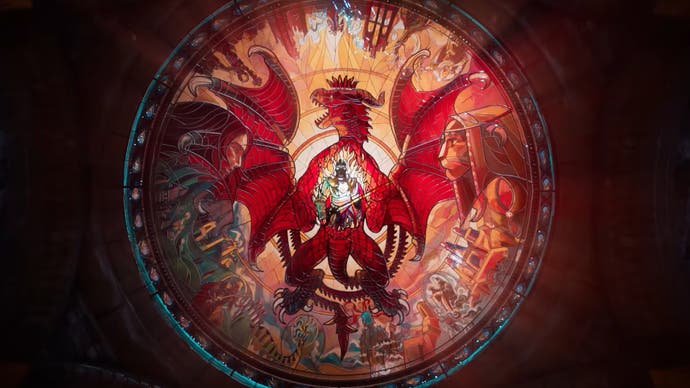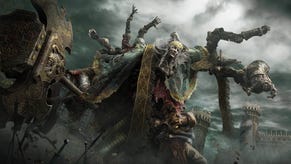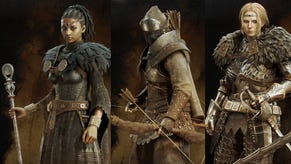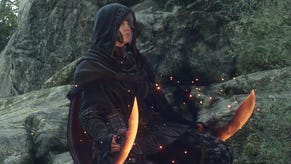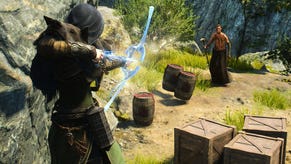Dragon's Dogma 2 review - endless discoveries paired with limitless potential
There and back again.
As I launched Dragon's Dogma 2 for the first time, I told myself that I should go into it with a more critical eye than I usually would. I think I was afraid that my overzealous love for the original might cloud my judgement. Then I blinked, and 10 hours had flown by. It was suddenly 3 a.m. on a Tuesday, and I'd been so engrossed in Dragon's Dogma 2 that I'd regressed back into the gaming schedule of my teenage years. I was now acutely aware of how tired I was, so I told myself I would save at the next available opportunity and go to bed. As I approached a nearby campsite, I spotted a troll and a dragon duking it out in the distance. I joined Team Troll, the clear underdog, and subsequently spent another 20 minutes avenging his death against the dragon. After a hard won fight, I decided it couldn't hurt to explore the nearby Ancient Battlegrounds for a few minutes.
I blinked again. It was 5 a.m. now. As I finally managed to pull myself away from Dragon's Dogma 2, I realised attempting to be unbiased may no longer be possible, because Dragon's Dogma 2 isn't bothered about appeasing those who had issues with the original game. In fact, it's trying to do the complete opposite - it's doubled down on everything that fans of the original game loved in the hopes of catering to its target audience, which just so happens to be me.
Dragon's Dogma 2 is an intentionally difficult game to summarise. From the outside looking in, it's a hack-and-slash RPG set in a fantasy world, with its grand, over-the-top boss battles serving as its main draw. In reality however, Dragon's Dogma 2 is a test in perseverance.
Every second, in every location, something is begging for your attention. Your Pawns, your AI controlled buddies that follow you around, will either be gossiping to each other or trying to catch your eye so they can point you in the direction of a nearby secret. The roads you travel will regularly, often subtly, branch off into something indiscernible in the near distance, baiting you towards what could be a treasure chest or new questline. Sometimes a massive boss monster will casually appear out of nowhere, just to glide above you before nesting in a location not too far out of reach. Maybe you'll run into a random NPC during your travels, who will offer you a quest of a time-sensitive nature that you will have to either accept and tackle immediately, or ignore and risk never being able to complete again in the future. And occasionally, all of these events will happen simultaneously, events you will have to ignore if you plan to get to the objective you initially set out to tackle in a timely manner. It's a game about opportunity cost.
This focus on "emergent gameplay", as director Hideaki Itsuno refers to it, isn't some new, groundbreaking idea, but Dragon's Dogma 2 is the purest version of the idea I've ever seen. I could regale you with dozens of stories of my adventures throughout Vermund, all of which feel completely unique to my playthrough, but I think my favourite occurred relatively close to the start of the game. I set out from Vernworth, Vermund's capital, towards the small port town of Melve. Near my destination was the Beastren commander Beren, who had previously asked me to procure some swords for him, which I had since acquired. The first time I made the trip from Melve to Vernworth, I was offered a ride in an oxcart, which I chose to accept. In doing so however, I missed the opportunity to explore the area in between, so I opted to walk back to Melve this time so I could see the sights on the way.
During my travels, I ran into a merchant on the road who asked me to escort her to a camp near Melve. Naturally, I agreed. I don't remember the merchant's name, because, less than three minutes into our walk, an ogre proceeded to use its club to rocket her into the nearest body of water. Fighting the ogre itself wasn't too tough, but, just before I killed it, a griffin swooped down from above and crushed the ogre to death. My subsequent battle with the griffin was a little more challenging, mostly because my party was underleveled and we didn't have access to any appropriate magic attacks or buffs that could have weakened it. Still, we managed to get the better of it, as a flurry of blows dealt by my main pawn Rose (as she clung to its back in midair) caused it to come crashing to the ground.
My party took advantage of its downed state and whittled it away to its final health bar. We were poised to come out of our fight victorious - until a roaming oxcart turned the corner at an alarmingly fast speed, running over and killing both myself and the griffin. I begrudgingly used my only wakestone to revive myself. The griffin wasn't so fortunate. The oxcart that had just murdered me had come to a stop in the middle of the road, presumably so they could get my insurance details. Now that my maximum health had been greatly reduced and I was out of wakestones, I once again chose to hop on the oxcart and fast travelled to Melve. Once the screen faded in and out to black, I could suddenly hear the ominous sound of boss music. The driver of the oxcart and the singular soldier that had carpooled his way there with me jumped to action, sprinting towards Melve's centre. A dragon was attempting to raze the city. Luckily, I was assisted by Melve's small battalion of troops - and, of course, one random oxcart driver.
Everyone survived the battle, except the oxcart driver, which I initially believed was some form of karmic retribution for his hit and run attempt on my life - until I realised I would be walking back to Vernworth. This is the entire game in microcosm.
The expansion of the emergent gameplay that was present in the first game isn't the only element that Dragon's Dogma 2 has chosen to improve, however. The story in the sequel is a lot more compelling than it was in the first game, and no longer suffers from a noticeable dip in quality during its middle act, which previously saw you aimlessly meandering around with no clearly defined objective. The plot also does a great job of guiding you across the map itself. Even before the first main city, Vernworth, begins to feel stale, the main questline will direct you towards the Beastren land of Batthal and beyond. There are also a couple of examples of previously hated quests making a return, but with small quality-of-life updates that make traversing them much more fun. For instance, there are a few forced stealth missions in the main story - missions that felt painfully shoehorned into the original game. The difference here is that there's a specific class, the Thief, that trivialises stealth, which you can temporarily swap to and from with ease.
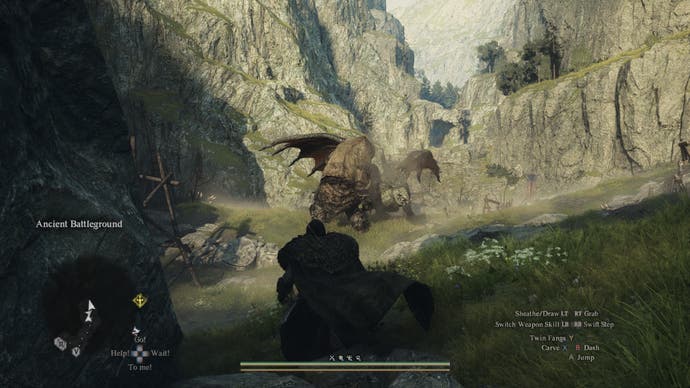
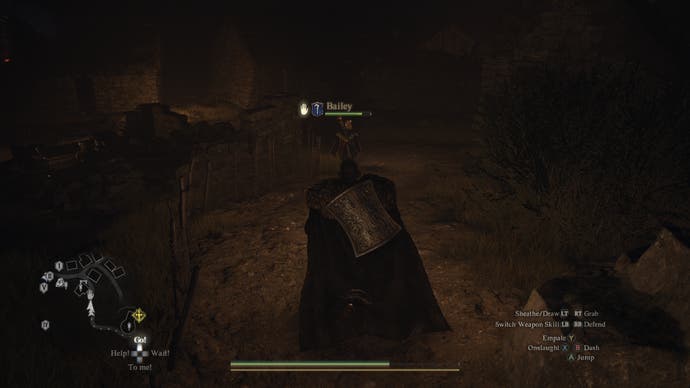
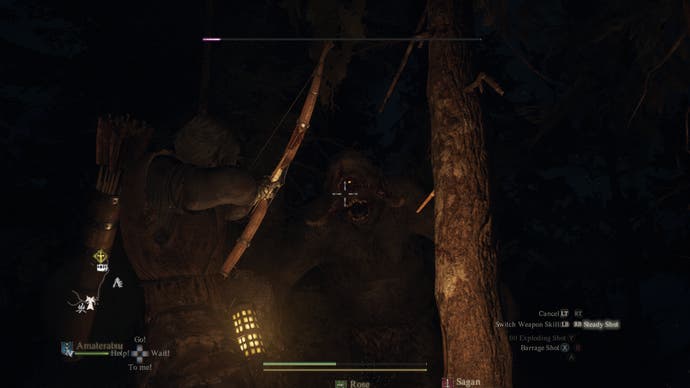
The lack of direction many disliked in the original is still present in the sequel, but with several added caveats. Should you ever feel completely lost during a quest, you can consult a local fortune teller, who will offer you hints related to your currently selected quest in exchange for a small fee. Pawns are also far more useful in guiding you towards your objectives than they ever were in the first game. Should a Pawn in your party have knowledge of the quest at hand, simply instructing them to "Go!" will cause them to offer advice, or begin sprinting in the direction of your objective. If you don't currently employ a Pawn that has knowledge of your current quest, you can simply visit a Riftstone and filter your search results for a Pawn that does. Personally, I loved figuring this stuff out on my own, so it's great that the help you're offered is completely optional (if you're a weirdo like me who enjoys aimlessly walking around and talking to NPCs).
The biggest and most welcome change is to the Vocations, the 10 unique classes you can freely swap between during your playthrough. In the original, three of the Vocations served more as upgrades to other Vocations, rendering the original three classes you could choose somewhat irrelevant in the late game. In Dragon's Dogma 2, the Vocations have been reworked to lean more into their established roles. For instance, Warrior is no longer simply a stronger version of the Fighter class, but instead now focuses on breaking an enemy's guard through the use of charged, armoured attacks. The Fighter's role as a Tank has been emphasised in turn, by adopting certain moves that the now discontinued Mystic Knight from the first game class had.
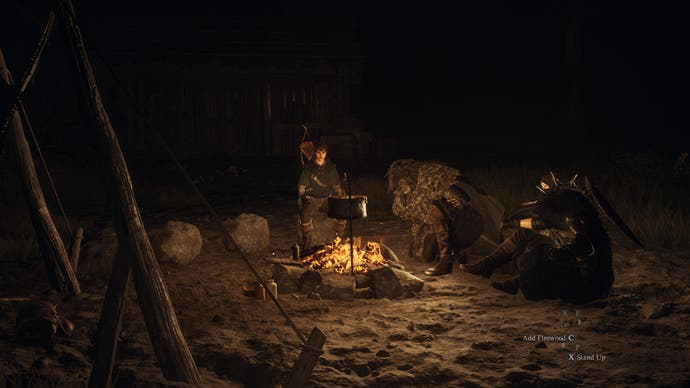
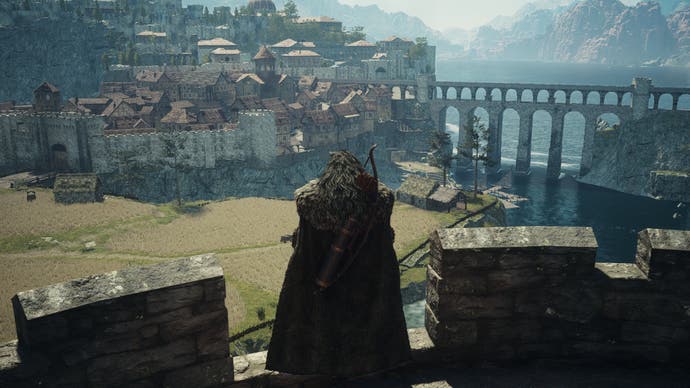
Likewise, many fans of the original game were disappointed to find out that the Thief and Archer classes wouldn't have upgraded Vocations, but the focus on making every class feel unique and fully realised makes it clear that the new intention is to make every Vocation powerful and distinct enough by themselves. Every Vocation, once fully levelled up, feels so overwhelmingly strong that some kind of upgraded version of any of them would be laughably busted, which actually seems like a clever way of guiding the player toward trying out several different Vocations during one playthrough. Whilst your unique skills don't transfer from one Vocation to another, the unique augments you unlock by playing as a specific Vocation do - and most of these augments are designed to be broad enough in their application that several other Vocations can benefit from using them too.
The map itself has also received a huge glow-up when compared to the first game. Dragon's Dogma 2's director Hideaki Itsuno previously stated that the map is four times bigger than that of the original game, but it's not simply bigger; it's more densely packed with secrets and hidden quests, set across several uniquely designed locations with different races you can interact with. If you've played Elden Ring or Skyrim, you probably remember the first time you set foot in the Siofra River or Blackreach, astounded at how such a huge area was hidden completely from view and could be missed entirely during your playthrough. That's happened to me three times so far in Dragon's Dogma 2, and I still have so much more of the map left to explore.
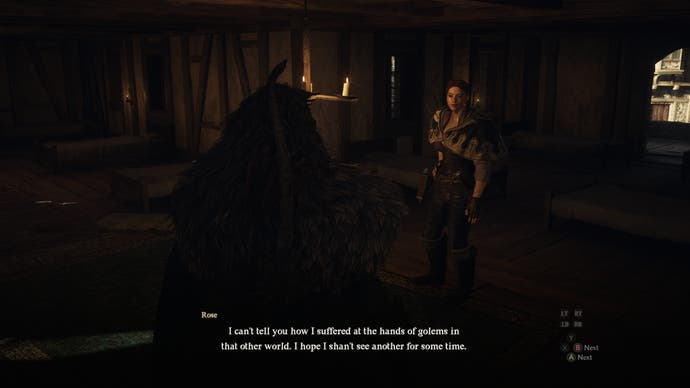
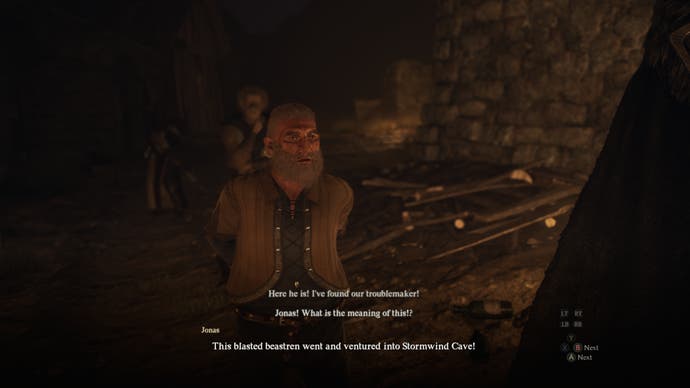
Yet, just like in the original Dragon's Dogma, you are still expected to spend most of the game traipsing across the map on foot to reach different quest objectives. There are options for fast travel, but they still come with downsides. Ferrystones can be used to instantly fast travel to a handful of select locations, but they're rare and expensive. Oxcarts can be used to travel from one city to another, but the destinations they travel to never change. This means you will potentially have to get several oxcarts in a row and rest in-between certain stops along the way, as Oxcarts only operate during the day, if you want to travel to a specific city - something that you might want to avoid if the quest you're trying to reach can be failed if you take too long to complete it.
The big improvement here is that the map has been intelligently designed in such a way that even the most direct route to your objective will have several different paths you can take along the way, ensuring that multiple trips across the map will never get boring as unexplored, yet equally fast, routes will lead to new discoveries. There are also several shortcuts you can unlock as you travel, some of which can save you up to 20 minutes of traversal. I know it's considered laughable when a video game reviewer compares other games to Souls games, but the depth to the interconnected nature of the map did give me flashbacks to my first time playing Bloodborne - except in Dragon's Dogma 2's case, it's on a much wider scale.
Sadly, I do have one small criticism, although thankfully it is a lot less detrimental than it might initially appear to be. I did run into some performance issues on PC, specifically in regards to some occasional frame droppage. Now, I should note that I never ran into any drops in frames in the open world and managed to run at a pretty consistent 120FPS, so oddly this was never an issue during combat. I only ever experience drops in frames during my time in the two biggest cities in the game, and these drops did seem specific to certain locations within those cities, such as in Vernworth's town square. However, I was running the game with all of the graphical settings at their highest, so I was able to completely offset these drops in frames with some slight tweaks that barely impacted how pretty the game looked - changes I could revert once I left said cities.
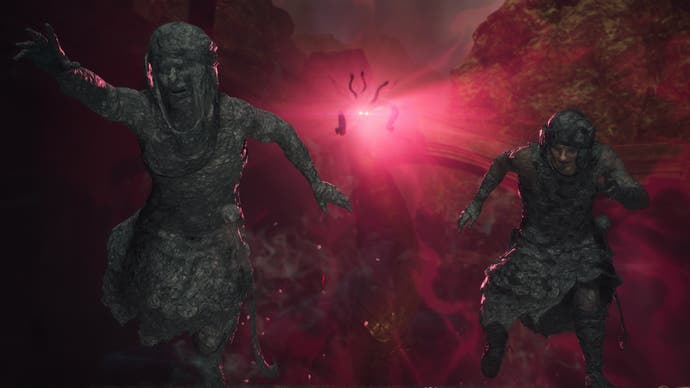
Outside of this, Dragon's Dogma 2 ran smoothly, looked incredible, and I honestly can't think of a single bug or glitch I encountered during my playthrough. Considering how beautiful Dragon's Dogma 2's world is, both from a graphical and visual design standpoint, to be frank I'm surprised I didn't experience further performance issues beyond this. During that dragon attack in Melve I spoke of earlier, a mage in my party cast a screen-encompasing blizzard, covering the dragon in a frosty texture as the light from the spell and the dragon's fire reflected off the nearby ocean in tandem - all while 20 or so NPCs helped attack said dragon alongside us. Yet, not a single dip in frames occurred. Hopefully the frame rate issue within certain cities is something Capcom can fix in the near future, because outside of this critique I can confidently say that Dragon's Dogma 2's performance on PC was perfect.
As of writing this, I'm roughly 60 hours into Dragon's Dogma 2. 60 hours was more than enough time to complete Dragon's Dogma 2's main story, to max out four of the available vocations, and to explore just over half of the locations on the map, but I'm still fairly certain another 60 hours of playtime lay ahead of me - and that's not even taking a second playthrough into account. Yet, going into specifics about some of the things I experience during my playtime would feel wrong - not because I'd be spoiling plot details, but rather because I'd be spoiling gameplay mechanics that have yet to be revealed.
Last year, I published a retrospective piece on Eurogamer about why a lot of people gave up half way through playing the original Dragon's Dogma. I noted that Dragon's Dogma hides a lot of its mechanics from the player, only choosing to reveal them when either the time was right or when the player accidentally stumbles across them. In Dragon's Dogma 2, this same mentality of "show, don't tell" is back, only more so. There are so many weird and wonderful hidden mechanics operating in the background of this game, things that haven't been publicised or bragged about by the developers anywhere that I've seen. It's so rare to see restraint of this kind from a publisher, to hide all of these tiny little tidbits from players when announcing any single one of them could have easily spurred a news article into existence that would have generated further buzz for the game, but the frequency at which I uncovered them only further enhanced the magical feeling of discovery Dragon's Dogma 2 is trying to inspire.
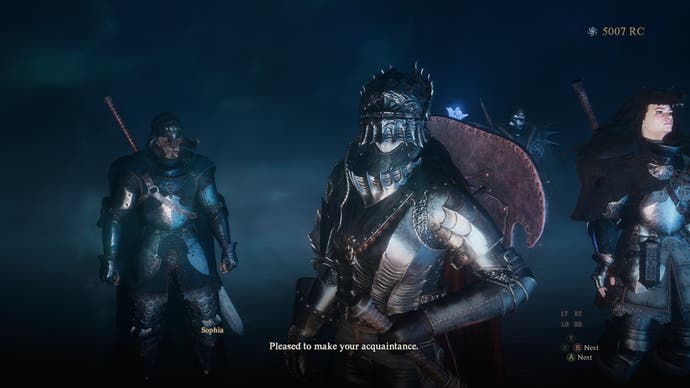
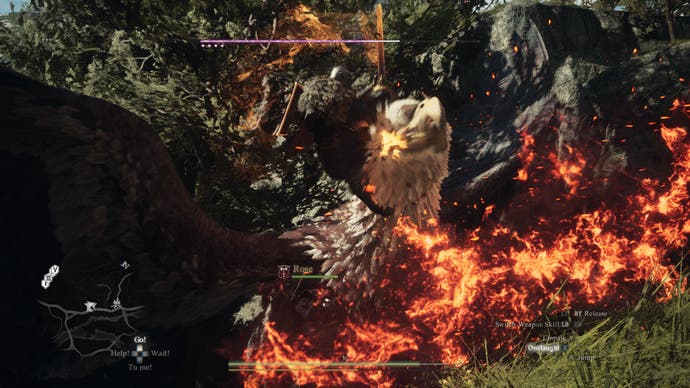
Dragon's Dogma 2 is such a compelling experience going in blind that I am asking, borderline begging, you not to spoil it for yourself. It's a game that dares to let the player make mistakes, and locks you into making these mistakes with its autosaves. Yet, the mistakes aren't meant to punish you. They're meant to educate you - and they have an odd way of rewarding you in turn. Considering Dragon's Dogma 2's length and the sheer breadth of the explorable locations and quests within it, you are expected to get things wrong sometimes. I did, frequently. But those brave enough to take Dragon's Dogma 2 up on its challenge will be rewarded with a world that reacts in kind to the errors they make. That might truly be the most unique thing that Dragon's Dogma 2 offers players, a world which adapts and changes based on the decisions you make through simply playing the game, opposed to other RPGs that have you influence outcomes through dialogue choices.
It might have seemed a little heavy-handed how often I compared the first Dragon's Dogma to Dragon's Dogma 2 during this review, but there is no better, more apt way to describe this game than by saying "it's like the first Dragon's Dogma, but better." If you're a fan of the original, you'll no doubt be thrilled to hear that, but if you weren't I would suggest you attempt to discern whether or not the aspects of the first game you didn't enjoy have been addressed in the sequel.
If initially difficult combat (that gets even harder at night), quests that can be permanently failed (due to the lack of a manual save option), or having three ye olde British NPCs (who repeat the same 30 conversations ad nauseum) follow you around for the entire game is what led you to quit the first game, then unfortunately I would suggest you steer clear from the sequel. But if you were simply turned off by the plot, or the fast travel mechanics, or how little there was to explore in the open world, then I implore you to give Dragon's Dogma 2 a try. This is genuinely a game like no other I've ever played before, because the only other game like it is the original Dragon's Dogma - a game that now feels irrelevant due to the improvements the sequel has made to every aspect of the original formula.
I do think a lot of what Dragon's Dogma 2 does scratches an itch for me, and that some of the things I love about it are specific to me. But the longer I've played it the less I've worried about my own bias towards it. Even if I hadn't have played the first Dragon's Dogma, I can tell you with complete certainty that I'd have come to same conclusion I have now, and I'd have given Dragon's Dogma 2 the same score I have now, simply because no other game in recent memory has inspired the same feeling of captivation and wonder in me. The joy of discovery lies within all of us, and Dragon's Dogma 2 succeeds in evoking that magical feeling in a way no other game has before it.
A copy of Dragon's Dogma 2 was provided for review by Capcom.
